|
|||||||||
If you have come
to this page through a frame, |
|||||||||
Larry Dodson is the Bar-Kays' lead vocalist and is blessed with one of the most characteristic voices and singing styles in the business. Larry joined the group in 1970 for the "Black Rock" album. When did you begin to sing? Was it in church?
Who were the other members in the Temprees? Ahh, the same ones that are there now. They're back together, you know? It was Jasper "Jabbo" Philips, Del Juan Calvin and Harold Scott. It was from high-school, until I joined the Bar-Kays. Do you come from a musical background? Well, my father was a saxophonist. In the very early days, he played with B.B. (King) for just a little bit, but my mother didn't like it, though. Why? Because it made him stay out too late, around too many women probably. So she just told him that if they were gonna get married, he'd have to give that up. Which he did (laughs). Who influenced your vocal style? I listened to a lot of Ray Charles when I was really young and then as I grew older I listened to Sly & the Family Stone, Stevie Wonder. Basically, those are my influences and my favorite artists as well. One of your vocal trademarks is the wailing "owww", which can be found in different versions, one being practiced by Cameo's Larry Blackmon. Where did you get it from? Was Leroy "Sugar" Bonner of the Ohio Players your main influence in this matter?
To me, your career in the "oww-business" started in the mid seventies, after you had left Stax and signed with Mercury... Yeah, Sugar was there. The Ohio Players were there. I admit to that. I liked it, in the earlier days I wasn't doing it, I was in a different type mode. And when we signed with Mercury, we changed our music anyway, so...I admit to that. What do you feel most comfortable singing, ballads or uptempo numbers?
A lead vocalist with such an unique voice and vocal style such as yours, must have been approached by people who suggested that you'd be better off going solo. It's happened. I was approached. Especially during the period when we weren't as popular and we didn't do things. People came up to me and said I was real stupid. But I was just determined, I wasn't gonna leave like that. I was not gonna leave the Bar-Kays on a low note. If I decided to do something like that, which I have thought of, it's a business move now, it would be at a point where the Bar-Kays were very hot. For two reasons. It's just something inside of me that would not say "well, the Bar-Kays aren't happening" plus I don't wanna leave the Bar-Kays like that. If I decide to do something else, it will come at a point when the Bar-Kays have come back, done a great album, touring good and are doing things again. Maybe it's stupid, but I wouldn't do it any other way.
I play piano, guitar and bass. At least well enough to write. Were any of you guys in the Bar-Kays trained musicians? Did you ever write down notes when you composed? No we didn’t use notes. We very seldom did. In fact, even in the early days none of the guys could read or write music. Some of the horn players could read but most of it was all done by memory. Which is your favorite Bar-Kays album and song and why?
Going back to 1990. What happened in your life after the deal with Mercury expired? Well, first we went to a label called Jaguar, but that never developed. Then Winston (Stewart) left. He had sort of gone back and forth, in and out of the band and about two years ago, after we came back from Japan, he decided to give this up. He got involved in the church and decided to play full time in church. Harvey (Henderson) decided to quit too and then James (Alexander) came back.
We went to a label called Tav-Dash, a small independent label, but before things got off the ground, it folded. The road back has not been easy. After that we were offered a contract at Zoo Records, which was a division of BMG. This was a more reputable situation. We stayed there for almost a year and we had a record called "Put A Little Nasty On It". It was a short-lived situation. The record got out and it charted, but due to inner record company politics, they decided to close that label we were on. So once again, there we were..(laughs).
Have you started producing other acts?
Isn't it difficult for an old band, like the Bar-Kays to try and keep up with the times, without losing your old, die-hard fans? I mean, how do you maneuver between adaptation to what today's record buyers and radio want, without losing your identity as a band? Our die-hard fans don't like us to deviate that much. It's a very precarious situation because you know, we're celebrating thirty years in the business this year and it's almost like you have to find your place in radio. Our age bracket, which is basically the 35-50, our die hard-audience, don't really buy records. So if you make your music directed at them you're gonna find yourselves not selling. It's a fine line. You got to do a little something with your music to get radio-friendly so that you can gain new audiences and still maintain your Bar-Kays funk, your Bar-Kays signature. I'm gonna tell you something interesting we did on the new "Boys In The Band" album. (Note! When released in October 1996, the album Larry speaks of was re-named "Best Of Bar-Kays") . We did three re-makes; "Shake Your Rump To The Funk", "Soul Finger" and "Too Hot To Stop". These songs are intermingled with five new songs. So when our die-hard fans may hear something that sounds a little too new for them, then we've re-done "Shake Your Rump To The Funk, these old songs for them and also a special version of "Soul Finger" as a anniversary special collector's edition. In what way has the business changed since when the Bar-Kays and Polygram went separate ways?
What other bands are currently gigging? Doesn't many of the so-called "re-formed" old-school bands include very few of it's original members? It used to be like that, yeah. But now, The Ohio Players are out there with five original members, War is back with four, Lakeside has five of it's original members. The Commodores have sort of suffered like we have, because they're down to two or three original members, but for the most part, everybody's back out there with most of their original roster.They're all getting back together, so the music is closer to what it was. What do you think is the reason for this "old-school" revival?
To me, a logical way to promote and bring forward an old band (who naturally has experience and a lot of know-how) would be to team them up with one of today's hot producers. In theory, both parties would gain from the experience. Why is that such a difficult task to perform in reality?
But it's starting to happen. You have the Coolio and Lakeside thing, for example. Coolio sampled "Hit & Run" on his very first record, he called it "County Line". It didn't do as well, but then he tried Lakeside's "Fantasic Voyage" and it was a huge record. The he did a sample of Kool & The Gang's record; "Too Hot" and it was fine and now he's done "All The Way Live" with Lakeside. It's beginning to happen. But we were speaking more of combining today's' producers with seventies' and eighties' bands. It's gonna come, but first of all they're very expensive. Bands like us don't have big record contracts that will permit you to spend seventy-five thousand dollars to secure a producer. So it's a money thing. And there's not enough love, so to speak, from these hot-shot producers to say "don't worry about my fee, I'll cut it down to a third". They're not gonna do that. They're gonna say " You go find you a record company to pay it or we can't get it done". There are some producers who would like to work with old bands, but they say "hey my fee is my fee, you don't have a record deal, I don't wanna deal with you". And there are not many of the old-school bands that have record deals! Cameo has one, Bar-Kays, Gap Band, George Clinton has one.. But most of the bands are just out there touring, it hasn't gotten to a record stage yet. Money is a big problem. Is the competition hard between the bands? Ohh, it's fierce now! (laughs). What's happening is that we're finding promoters who will package, for instance, we just played Philadelphia with Cameo and the Ohio Players. It's that kinda thing going now. Three, four, sometimes five acts, but when you get out there by yourself it's kinda hard. Because they'd much rather package the three acts, because you guarantee a bigger audience when you play three acts together. By the way, Frank Thompson plays with Cameo now! And Lloyd (Smith) was there, he lives in Philadelphia, and they both sat in and played. What musicians are playing with you when you perform?
But do you have live horns? Right now we're using keyboard horns, sampled horns, on stage, but I was reminded of how much I missed the horns when Frank played with us, so I'm gonna get the horns this fall. I've noticed that the Ohio Players have just hired four horns. Gap Band just hired three and Cameo has an excellent horn section, so now the Bar-Kays are the only ones that don't have horns! (laughs). I got to hurry and get mine, plus I miss 'em. They're a great part of our sound and you just can replace 'em with synthesized horns. It was economic at first, but now that I'm doing better, financially, I can afford to have 'em. What other news have you got from the Bar-Kays camp? We've started a scholarship foundation, called the Bar-Kays Scholarship Fund, we're sending kids to college and in October we're gonna have a thirty-year anniversary re-union concert. It's gonna be televised and filmed for a one-hour TV-special. It's an anniversary show, but we're also gonna re-unite Bar-Kays members. From there we leave and go to Africa and Japan. |
|||||||||
|
Home | Discography | Bio |
||||||||
© Maria Granditsky
September 1996. |
|||||||||
|
Home - Artists - What's New - Links - FAQ - Theme - About Me |

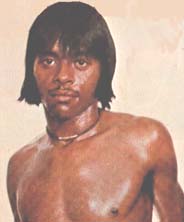 I’ve
been singing all my life, started when I was very young. But, no, I didn’t do much
singing in church. I did go to church, but I wasn’t that involved. I started a vocal
group when I was around eleven or twelve called the Temprees, which went on later in the
years to become a very successful group.. We recorded local records, but they didn’t
do that much. We stayed together until about 1970. At that time I had to make the decision
on whether I wanted to stay on with them or go with the Bar-Kays and I chose to go with
the Bar-Kays. After I left to join the Bar-Kays, Temprees went on to record professionally
and made a couple of big hits. The Temprees recorded for Stax and so did the Bar-Kays.
Temprees had about four big hits, most were slow, they were ballad singers.
I’ve
been singing all my life, started when I was very young. But, no, I didn’t do much
singing in church. I did go to church, but I wasn’t that involved. I started a vocal
group when I was around eleven or twelve called the Temprees, which went on later in the
years to become a very successful group.. We recorded local records, but they didn’t
do that much. We stayed together until about 1970. At that time I had to make the decision
on whether I wanted to stay on with them or go with the Bar-Kays and I chose to go with
the Bar-Kays. After I left to join the Bar-Kays, Temprees went on to record professionally
and made a couple of big hits. The Temprees recorded for Stax and so did the Bar-Kays.
Temprees had about four big hits, most were slow, they were ballad singers.  (laughs). To be quite honest, I was influenced by "Sugarfoot" when
I started developing my wailing voice. Sugar was doing that, I heard that first,
that type of thing, but now, I was also influenced by Sly Stone, who Sugar too was
influenced by. Sly fathered all of that, so if it's anybody who's responsible for it I'd
say it's Sly. Sly had the "oww", that kind of whining voice and Sugarfoot and I
have both had versions of that. Larry (Blackmon) came later, he came after I did. He's the
third generation "oww-er". (laughs).
(laughs). To be quite honest, I was influenced by "Sugarfoot" when
I started developing my wailing voice. Sugar was doing that, I heard that first,
that type of thing, but now, I was also influenced by Sly Stone, who Sugar too was
influenced by. Sly fathered all of that, so if it's anybody who's responsible for it I'd
say it's Sly. Sly had the "oww", that kind of whining voice and Sugarfoot and I
have both had versions of that. Larry (Blackmon) came later, he came after I did. He's the
third generation "oww-er". (laughs). 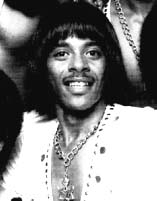 I'm
more comfortable doing uptempo stuff. For me that's more fun. I get more screams and
hollers on the ballads, but I like the funky stuff.
I'm
more comfortable doing uptempo stuff. For me that's more fun. I get more screams and
hollers on the ballads, but I like the funky stuff.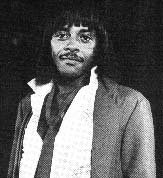 What
instruments do you play?
What
instruments do you play? 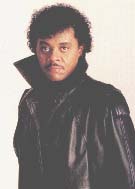 My
favorite Bar-Kays album is probably "Injoy" and my
favorite Bar-Kays song is "Certified True". I just
think it was one of the best put together records. It's one of the best records we've ever
done, all the way round, I think. There something a little magic that happened on
"Injoy". It was made in a very, very good period and when I think about it, it's
always pleasant memories. Plus, I think the cover was one of the best shots we've ever
taken and it was just a bright time in our career. Everything we went after on that album,
we accomplished. Usually in an album, you end up saying " I really like two or three
songs, but the rest of it I think we could have done better". Basically on
"Injoy", I think we did everything pretty good.
My
favorite Bar-Kays album is probably "Injoy" and my
favorite Bar-Kays song is "Certified True". I just
think it was one of the best put together records. It's one of the best records we've ever
done, all the way round, I think. There something a little magic that happened on
"Injoy". It was made in a very, very good period and when I think about it, it's
always pleasant memories. Plus, I think the cover was one of the best shots we've ever
taken and it was just a bright time in our career. Everything we went after on that album,
we accomplished. Usually in an album, you end up saying " I really like two or three
songs, but the rest of it I think we could have done better". Basically on
"Injoy", I think we did everything pretty good.  James
had been working with marketing, doing A & R on two or three different,
independent record labels and was doing real well. He came back after what could it have
been? Five years.. Anyway, we talked and decided it was a good thing to do and about
four years ago we had a reunion concert at a local club here in Memphis. I guess it was
about fourteen or fifteen guys who had been in the band throughout the years. It was James,
Harvey, Winston, myself, Mark Bynum, Frank Thompson, Ben Cauley, Hubert Crawford, Dwayne
Jones, Sherman Guy, Larry Johnson and Roy Cunningham. It was a
very good night, packed house, and it was something that was talked about for months and
months after it happened. It was really, really good and after that, I think it sparked
something.
James
had been working with marketing, doing A & R on two or three different,
independent record labels and was doing real well. He came back after what could it have
been? Five years.. Anyway, we talked and decided it was a good thing to do and about
four years ago we had a reunion concert at a local club here in Memphis. I guess it was
about fourteen or fifteen guys who had been in the band throughout the years. It was James,
Harvey, Winston, myself, Mark Bynum, Frank Thompson, Ben Cauley, Hubert Crawford, Dwayne
Jones, Sherman Guy, Larry Johnson and Roy Cunningham. It was a
very good night, packed house, and it was something that was talked about for months and
months after it happened. It was really, really good and after that, I think it sparked
something. 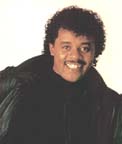 This
led us to Basix Records, where we put out the "48
Hours" album. We used some younger producers, you know? James' son,
Phalon, helped us on some cuts. All of this has been in our efforts to come back and do
things. Now, we still worked, while we were doing this, in our rebuilding stages. We
struck on to something and we did a real good album with "48 Hours" and from
that album came a cut called "Bar-Kays Mega Mix" which
was like a medley of our earlier songs. It did real well and then we released a record
called "The Slide". It did fine, so when it came out, Curb
Records heard it and because Basix was an independent label, Curb said "We
like the song, we like the album, give us a shot to pick it up and help you with it".
So they picked "The Slide" up and we got married to Curb Records. Curb is
distributed by the WEA group, Warner Brothers, Elektra, Atlantic group.
This
led us to Basix Records, where we put out the "48
Hours" album. We used some younger producers, you know? James' son,
Phalon, helped us on some cuts. All of this has been in our efforts to come back and do
things. Now, we still worked, while we were doing this, in our rebuilding stages. We
struck on to something and we did a real good album with "48 Hours" and from
that album came a cut called "Bar-Kays Mega Mix" which
was like a medley of our earlier songs. It did real well and then we released a record
called "The Slide". It did fine, so when it came out, Curb
Records heard it and because Basix was an independent label, Curb said "We
like the song, we like the album, give us a shot to pick it up and help you with it".
So they picked "The Slide" up and we got married to Curb Records. Curb is
distributed by the WEA group, Warner Brothers, Elektra, Atlantic group. 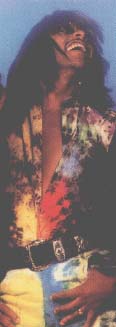 Yeah,
I've done Mr. Rod, he was a rapper that we had on our label, Jalaca.
That's James', mine and our manager's label. Then I did the "Electric
Slide" album, which is a various artists for Basix and I've produced a
blues album on a guy named Reggie Pettis, he's worked as a background
singer with the Bar-Kays. Right now I'm doing an album on Z/Da, that's
her stage name. She's signed to Curb. I've had the chance to stretch out. I took
everything that I learned from Allen (Jones, the Bar-Kays longtime
producer) and I wouldn't be in the shape I'm in now in terms of just basic, knowledgeable
things, had I not studied under him. I was born with a talent to write, I know that, but
to shape it up and to make it all make sense, that came from him.
Yeah,
I've done Mr. Rod, he was a rapper that we had on our label, Jalaca.
That's James', mine and our manager's label. Then I did the "Electric
Slide" album, which is a various artists for Basix and I've produced a
blues album on a guy named Reggie Pettis, he's worked as a background
singer with the Bar-Kays. Right now I'm doing an album on Z/Da, that's
her stage name. She's signed to Curb. I've had the chance to stretch out. I took
everything that I learned from Allen (Jones, the Bar-Kays longtime
producer) and I wouldn't be in the shape I'm in now in terms of just basic, knowledgeable
things, had I not studied under him. I was born with a talent to write, I know that, but
to shape it up and to make it all make sense, that came from him. 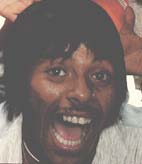 Ohh,
the business is much better now than it was, say, ten years ago, for 70's and 80's bands!
We're in a very nostalgic period right now. I don't know what's brought that on, if the
circle is turned or if time just brought us here, but everybody's real concerned now and
they're trying to find all the 70's old re-issues, old albums and it's just a frenzy going
on here in the States. So consequently, work is picking up, attention is being focused
back on the Bar-Kays. For the last two years we've toured a lot!
Ohh,
the business is much better now than it was, say, ten years ago, for 70's and 80's bands!
We're in a very nostalgic period right now. I don't know what's brought that on, if the
circle is turned or if time just brought us here, but everybody's real concerned now and
they're trying to find all the 70's old re-issues, old albums and it's just a frenzy going
on here in the States. So consequently, work is picking up, attention is being focused
back on the Bar-Kays. For the last two years we've toured a lot! 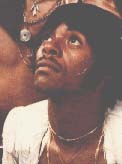 What
is happening is that the younger kids are curious, because rap has sampled so much of our
music, the seventies' and eighties' music. They wanna know who the original band, behind
that sample, was. There's a whole new era of kids that are growing up, digging the
seventies' and eighties' bands. The crowds are bigger and better now than it was ten years
ago too. Since rap is sort of on the decline, as far as concerts goes, what you have is
older people saying that "since rap is not coming to town five times a month",
the "old-school shows" are coming instead and it's given them something to do.
And radio is helping too. Radio has more formats throughout the day for
"old-school" listeners to listen to. There's "Back-tracks",
"Oldie-hour", whatever they call them, but five or six years ago there was only
one time a week you could hear it, usually on Sunday nights after six. But now it's all
through the week, two or three times a day and that's helping.
What
is happening is that the younger kids are curious, because rap has sampled so much of our
music, the seventies' and eighties' music. They wanna know who the original band, behind
that sample, was. There's a whole new era of kids that are growing up, digging the
seventies' and eighties' bands. The crowds are bigger and better now than it was ten years
ago too. Since rap is sort of on the decline, as far as concerts goes, what you have is
older people saying that "since rap is not coming to town five times a month",
the "old-school shows" are coming instead and it's given them something to do.
And radio is helping too. Radio has more formats throughout the day for
"old-school" listeners to listen to. There's "Back-tracks",
"Oldie-hour", whatever they call them, but five or six years ago there was only
one time a week you could hear it, usually on Sunday nights after six. But now it's all
through the week, two or three times a day and that's helping. Well,
I wouldn't mind working with one of today's top producers. But, here's that thing about
the responsibility the artist, such as the Bar-Kays, has towards their old fans. When you
go in there and record, you must have the producer respect those things about your sound
and your music and you don't want those things lost. It's a responsibility on both parts,
between those young, hot-shot producers and these quote-un-quote "old school
heroes", to come out with the best record that doesn't alienate your fans, so to
speak. Because that's very easy to do when you go too far. Doing a record with a hot
producer will get you attention from the radio programmers, but it won't sell, if it's
just not the right thing. It can secure attention from programmers, but working with
Babyface, for example, can insure you get listened to, but he's not gonna not insure
you're selling. It's a pretty good chance, though. (laughs).
Well,
I wouldn't mind working with one of today's top producers. But, here's that thing about
the responsibility the artist, such as the Bar-Kays, has towards their old fans. When you
go in there and record, you must have the producer respect those things about your sound
and your music and you don't want those things lost. It's a responsibility on both parts,
between those young, hot-shot producers and these quote-un-quote "old school
heroes", to come out with the best record that doesn't alienate your fans, so to
speak. Because that's very easy to do when you go too far. Doing a record with a hot
producer will get you attention from the radio programmers, but it won't sell, if it's
just not the right thing. It can secure attention from programmers, but working with
Babyface, for example, can insure you get listened to, but he's not gonna not insure
you're selling. It's a pretty good chance, though. (laughs). 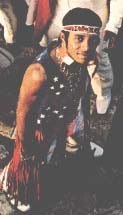 Right
now it's James, myself, Bryan Smith, (who is the co-producer with me
right now and he's been in the band for about four-five years), Michael Anderson
(guitar player, been in the band equally long), Tim Horton (three years)
and I have Curt Clayton on keyboards. He's been in the band for about two
years, Derick Dabbs, he's a newcomer, only been with us one year. Then
three new singers who have only been in the band five months. They're all from Memphis.
The band is ten members on stage now and the sound is not, if you close your eyes you
won't hear that much of a difference.
Right
now it's James, myself, Bryan Smith, (who is the co-producer with me
right now and he's been in the band for about four-five years), Michael Anderson
(guitar player, been in the band equally long), Tim Horton (three years)
and I have Curt Clayton on keyboards. He's been in the band for about two
years, Derick Dabbs, he's a newcomer, only been with us one year. Then
three new singers who have only been in the band five months. They're all from Memphis.
The band is ten members on stage now and the sound is not, if you close your eyes you
won't hear that much of a difference.